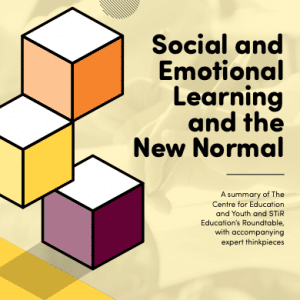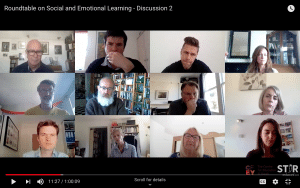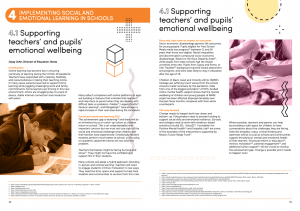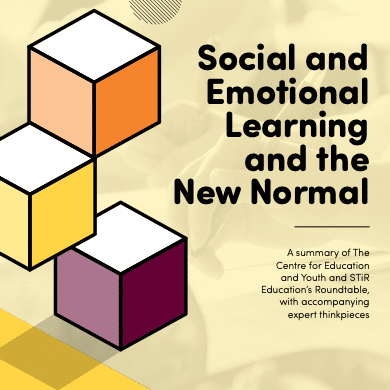What does the ‘New Normal’ mean for Social and Emotional Learning?
by Will Millard
25th August 2020
We are excited to publish a new report, examining what the ‘New Normal’ means for Social and Emotional Learning.
In early 2020, The Centre for Education and Youth and STiR Education decided to jointly host a roundtable, to discuss social and emotional learning (SEL) and its role in preparing children for the future. From this, we wanted to produce a succinct discussion paper highlighting some of the key issues facing SEL, in the UK and further afield. Only a matter of weeks later, a global pandemic had the world on its knees.
We faced a decision: should we cancel the roundtable? Following conversations with colleagues and friends throughout our networks, one message shone through: the need for and value of social and emotional learning is only going to increase. Consequently, in May 2020 The Centre for Education and Youth and STiR Education convened a roundtable discussion involving a wide range of partners from the worlds of academia, policy-making, school leadership and teaching. The conversation was structured around the following questions:
- What is the role of SEL in a post-coronavirus world?
- Up to now, how has SEL been developed?
- What are the challenges in promoting SEL?
- What will teachers and professionals want from SEL in a post-corona world and what support will they need?
You can view the discussions on CfEY’s YouTube channel, here and here, and the summary comments, here.
We were delighted that a wide range of contributors joined the discussion, sharing experiences and insights from schools, government and the third sector, in the UK and internationally.
The COVID-19 pandemic has changed education. As the virus has exerted its grip, schools have shut and children, their families and teachers have found themselves doing their best to adjust. Schools and governments are rethinking how they deliver education. Families are trying to create some sort of routine. Many are dealing with acute distress: bereavement, ill health, and financial uncertainty. Domestic violence and abuse have increased. Loneliness, boredom, anxiety, confusion and frustration run rife.
The crisis has highlighted more than ever the unpredictability of the world in which we live. Rightly, the impact on children’s learning has been widely discussed, and we face difficult questions, now and into the future. If the role of education is to prepare children for life in a world of unknown unknowns, how should education now be responding to this ‘new normal’?
The discussion at May’s roundtable offered many fascinating responses to these questions. Importantly, rather than adapting to a ‘post’-corona world, many participants emphasised that the virus will be a fact of life for the foreseeable future. Drawing on Franklin D. Roosevelt, we should therefore think about next steps in education is in terms of ‘Relief’, ‘Recovery’ and ‘Reform’, and this is how the report’s introduction is structured.
What does the 'New Normal' mean for Social and Emotional Learning? @TheCFEY and @STIReducation's report contains a wide range of insights, shining a light on the future of SEL: https://bit.ly/2XZiZjd. Share on XAfter 90 minutes of discussion, however, we felt that we were only beginning to scratch the surface. We decided that a simple summary of the discussion would not do justice to our participants’ wider knowledge. We therefore invited participants to elaborate on the ideas they shared through a series of short thinkpieces. We wanted to ensure that these thinkpieces would offer insights for a wide range of stakeholders in education systems, and we have therefore divided them into four categories: understanding SEL; practical ideas to implement SEL in schools; promoting SEL in different communities; and promoting SEL at the system level.
The intent of this report is not to present SEL as a silver bullet that can magically undo the damage caused by the pandemic. Rather, we hope that it promotes further reflection and genuine debate on SEL, and its role in ‘building back better’. We believe the ideas captured in this report provide cause for quiet optimism, and we very much look forward to continuing the conversation.
You can read more in my op-ed for Schools Week.


Comments